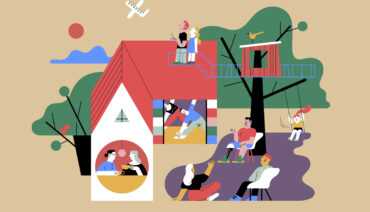In July, Cedos announced a competition for participation in the project “Laboratory of Evidence-Based Recovery and Cohesion: Support for Research” for local communities and organizations working at the local or regional level. As part of this project, we offered support in conducting research.
We received a total of 60 applications. Among them, an expert jury selected five organizations with which we will work on the implementation of research projects.
Cultural Change NGO
The organization operates in the Kharkiv region and focuses on supporting women, girls, and vulnerable groups in communities affected by the war in rural areas.
In cooperation with us, the organization wants to conduct a comprehensive study of the sexual literacy of girls aged 14 and older from rural areas, as well as analyze its impact on early family formation and childbirth compared to their peers from the city.
Charitable Organization “Co-Haty”
The organization builds housing for those who have lost their homes due to the war and seeks to develop and implement a model of affordable social housing in Ukraine.
The foundation is implementing a pilot project for long-term social housing in the city of Kalush, Ivano-Frankivsk region, where approximately 150 internally displaced people will live. The organization wants to study the process of settling into and living in social housing, as well as understand how affordable rental housing can create a deep sense of community belonging and maintain resident satisfaction. The research will help to better understand the processes involved in the development of social housing in Ukraine and apply these insights to future projects of Ko-Khat, communities, and donors.
Zminotvortsi NGO
Zminotvortsi is an educational organization that implements a free educational program for teenagers from villages and small communities (up to 10,000 residents).
The organization plans to study the worldview, needs, challenges, and motivations of Ukrainian teenagers from small communities. The project aims to establish a basis for more flexible, adaptive, and context-sensitive approaches to working with young people from small communities, a necessary condition for the sustainable impact of educational initiatives. Additionally, thanks to the research materials, educators will be able to tailor the educational process more effectively to the values and needs of their students.
U-Cycle (Kyiv Cyclists Association, NGO)
U-Cycle comprehensively develops sustainable mobility and promotes cycling as a mode of transport, advocating for cycling infrastructure at the national and local levels. The organization also co-founded the international humanitarian campaign #BikesForUkraine. Within its framework, Ukrainian volunteers and utility workers provide used bicycles. Thanks to this, humanitarian and other aid becomes more accessible to those who need it most in frontline and war-affected communities.
The organization seeks to gain a more systematic and evidence-based understanding of the people who use bicycles within #BikesForUkraine. The results will help improve and update the campaign, as well as advocate for the development of bicycle infrastructure at the national level as part of reconstruction and European integration.
Serhiy Prytula Charitable Foundation
The foundation operates in two areas: supporting the Ukrainian Armed Forces and helping civilians affected by the war. In particular, it provides the military with the necessary equipment and trains them in drone operation and tactical medicine. In the humanitarian sphere, it meets the urgent needs of communities and implements projects in demining, healthcare, and modular housing, among others.
The study aims to find out what motivates businesses to support charitable foundations.
What will the winners receive?
The project involves working with Cedos experts on a research project. Together with selected organizations and local communities, Cedos experts will plan the research, choose the methodology, collect and analyze data, and prepare a research report.
The research projects are part of the Evidence-Based Recovery and Cohesion Laboratory project, which is implemented with the financial support of the Matra Program of the Kingdom of the Netherlands. The project aims to strengthen the capacity of civil society and local authorities in Ukraine to assess the needs of vulnerable social groups and advocate for their interests in the national policymaking and recovery process.
Support Cedos
During the war in Ukraine, we collect and analyse data on its impact on Ukrainian society, especially housing, education, social protection, and migration







